The Pros and Cons of Renting vs. Buying

One of the biggest financial decisions you’ll face in life is whether to rent or buy a home. Both options come with their own set of advantages and disadvantages, and the right choice depends on your personal circumstances, financial situation, and long-term goals. In this article, we’ll explore the pros and cons of renting versus buying to help you make an informed decision.
Renting: Pros and Cons
Pros of Renting
1. Lower Upfront Costs
- Renting typically requires a security deposit and the first month’s rent, which is far less than the down payment needed to buy a home.
- No need for closing costs, property taxes, or homeowner’s insurance.
2. Flexibility
- Renting allows you to move more easily if your job or lifestyle changes.
- Short-term leases (e.g., 6 months or 1 year) provide flexibility for those who don’t want to commit to staying in one place for too long.
3. Less Maintenance Responsibility
- Landlords are responsible for most repairs and maintenance, such as fixing appliances, plumbing issues, or structural problems.
- You won’t have to worry about unexpected expenses like a broken roof or HVAC system.
4. Access to Amenities
- Many rental properties, especially apartments, offer amenities like gyms, pools, and community spaces that would be expensive to replicate as a homeowner.
5. Easier Budgeting
- Rent payments are predictable and usually fixed for the duration of the lease, making it easier to plan your finances.
Cons of Renting
1. No Equity Building
- Rent payments go directly to the landlord and do not contribute to building wealth or equity.
- You’re essentially paying to live in someone else’s property without any long-term financial benefit.
2. Limited Customization
- Renters often face restrictions on making significant changes to the property, such as painting walls, remodeling, or installing fixtures.
- You may feel less “at home” in a space you can’t personalize.
3. Rent Increases
- Rent prices can rise annually, sometimes significantly, depending on market conditions.
- Long-term renters may find themselves paying more over time compared to a fixed mortgage payment.
4. Lack of Stability
- Lease agreements can limit how long you stay in one place, and landlords may choose not to renew your lease.
- You’re at the mercy of the landlord’s decisions regarding rent hikes, property sales, or evictions.
5. No Tax Benefits
- Unlike homeowners, renters cannot deduct mortgage interest or property taxes from their taxable income.
Buying: Pros and Cons
Pros of Buying
1. Building Equity
- Mortgage payments contribute to building equity in your home, which can increase your net worth over time.
- As you pay down the loan and property values appreciate, your investment grows.
2. Stability and Control
- Owning a home provides long-term stability—you can stay as long as you want without worrying about lease renewals.
- You have full control over renovations, decorating, and customizations.
3. Potential for Appreciation
- Real estate often appreciates in value over time, meaning your home could be worth more when you sell it than when you bought it.
- This appreciation can serve as a source of profit or funding for future investments.
4. Tax Advantages
- Homeowners can deduct mortgage interest, property taxes, and certain home office expenses from their taxable income.
- These deductions can reduce your overall tax burden, especially in the early years of homeownership.
5. Pride of Ownership
- Owning a home can provide a sense of accomplishment and pride, knowing you’ve invested in a place to call your own.
Cons of Buying
1. High Upfront Costs
- Buying a home requires a substantial upfront investment, including a down payment (typically 3–20% of the purchase price), closing costs, and moving expenses.
- Additional costs like inspections, appraisals, and title insurance can add up quickly.
2. Ongoing Expenses
- Homeownership comes with ongoing costs like property taxes, homeowner’s insurance, utilities, and maintenance.
- Unexpected repairs (e.g., roof replacement, plumbing issues) can strain your budget.
3. Market Risk
- Property values can fluctuate, and there’s no guarantee your home will appreciate in value.
- If you need to sell during a downturn, you could lose money or struggle to recoup your initial investment.
4. Less Flexibility
- Selling a home is a lengthy and costly process, making it harder to relocate quickly.
- If your job or personal circumstances change, being tied to a property can feel restrictive.
5. Maintenance Responsibilities
- As a homeowner, you’re responsible for all repairs and upkeep, which can be time-consuming and expensive.
- Aging systems (e.g., HVAC, water heaters) may require costly replacements.
Key Factors to Consider
When deciding between renting and buying, consider the following factors:
1. Financial Situation
- Do you have enough savings for a down payment, closing costs, and emergency funds?
- Can you comfortably afford monthly mortgage payments, property taxes, and maintenance?
2. Length of Stay
- If you plan to stay in one location for several years (typically 5+), buying may be more cost-effective due to the potential for equity growth.
- For shorter stays, renting is often more practical since selling a home shortly after purchase can result in losses.
3. Local Housing Market
- In areas where home prices are rising rapidly, buying may be a smart investment.
- In markets with high rental demand, renting might offer better value.
4. Lifestyle Preferences
- Do you value flexibility and minimal responsibility, or do you prefer stability and customization?
- Your lifestyle and priorities will heavily influence whether renting or buying aligns with your needs.
Renting vs. Buying: A Comparison Chart
| Factor | Renting | Buying |
|---|---|---|
| Upfront Costs | Low (security deposit + first month’s rent) | High (down payment, closing costs, etc.) |
| Monthly Payments | Predictable, fixed | Fixed (with fixed-rate mortgage) |
| Equity Building | None | Yes |
| Maintenance | Landlord’s responsibility | Owner’s responsibility |
| Flexibility | High (easy to move) | Low (harder to relocate) |
| Customization | Limited | Full control |
| Tax Benefits | None | Mortgage interest, property tax deductions |
| Market Risk | None | Possible loss if property values decline |



